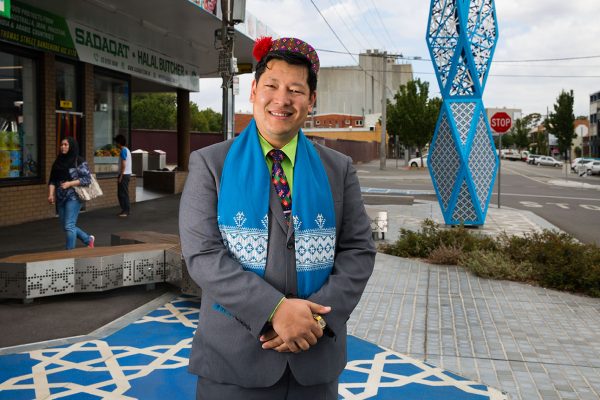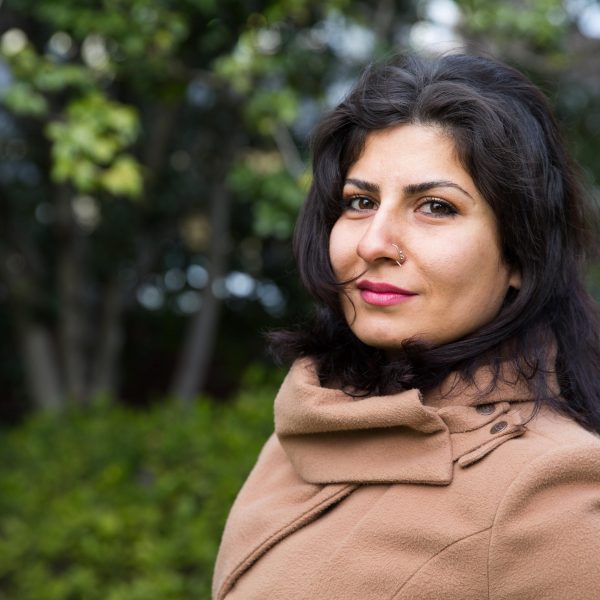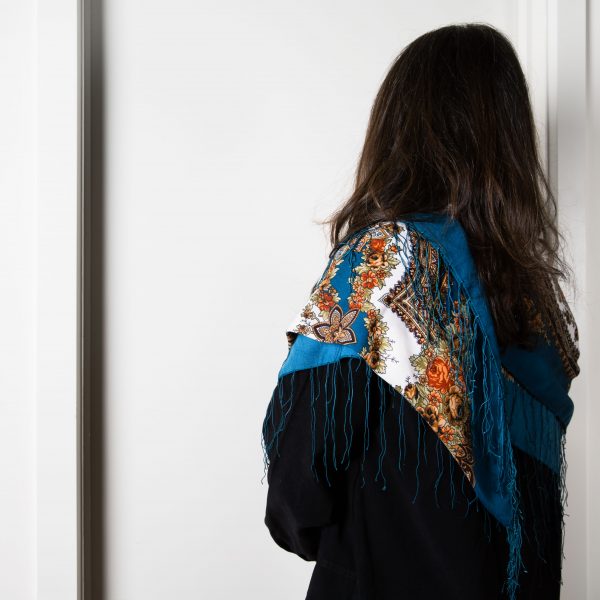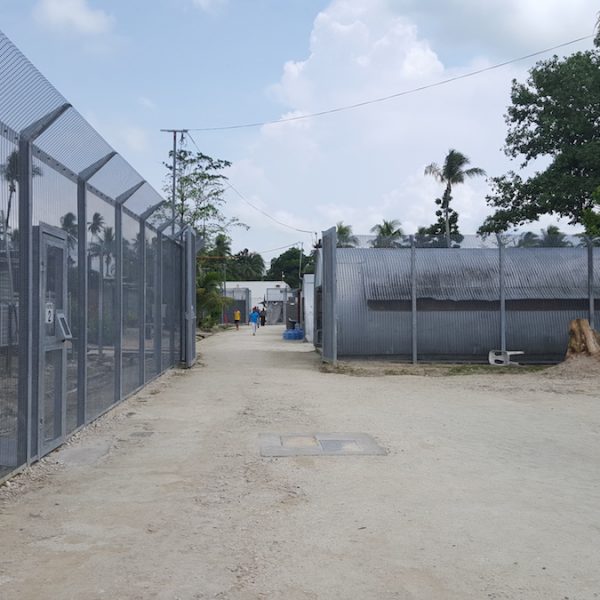
John Gulzari fled Afghanistan in 1999. He was detained for three months at Curtin Detention Centre in Western Australia. John became an Australian citizen in 2007, and now lives in the Melbourne suburb of Dandenong, where he has twice run for local elections.
WE WERE HAPPY IN OUR VILLAGE
I came from central region of Afghanistan, a region called Hazarajat, and that basically means the land of Hazaras. There’s not much things in my small village, there’s a few trees and grass, we have streams running down the village, there’s a few shops, very limited. I think there’s two to three hundred houses. And it’s surrounded by mountains.
My family is poor farming family. I had my mother and father, and also five siblings. I am second eldest. I have a few memories of when I was in my childhood and I was playing with my friends, together enjoying community events. But since I was born, there has always been war and fighting in my country, it has never seen the light of good day. It is terrible memories, but I think we were happy in our village.
PREPARE TO DIE
The reason I abandoned the country is because of the persecution, torture, killing, land-grabbing of the Taliban regime, which has historical roots. There’s two sects of Islam, Sunni and Shi’a. There was a king called Abdur Rahman Khan, that was between 1880 to 1901, he gathered all the Sunni sect of Islam and tell my tribe, Hazara, which is Shi’a, that they are not real Muslim, and they should become Muslim — means join their sect — otherwise, leave the country or prepare to die.
And the same thing was echoed post-2000, where there is Mullah Niazi who was a commander of Taliban. He said that Uzbek can go to their own country, Uzbekistan; Tajik, another minority, can go to Tajikistan; Pashtun can go to Pukhtunistan, which is part of Pakistan and Afghanistan; but Hazaras have no land, so they have to go to gorestan, which means graveyard. That was a really chilling statement. And for past century and half, our people have never found a place which is peaceful for them.
Taliban came to our area before 2000, because they were searching for weapons. When they came to my house they were shooting around, my older brother was there, he was shot and he died. They were also searching for myself and for my other brother. They were taking young people from their homes by force and recruiting them as a soldier and sending them to the front line.
We had a bit of land, we sold part of it, and my father arranged with a smuggler to take me out from there, from Afghanistan to Pakistan. And then from there making me a false passport where I can travel to Indonesia. I was quite scared because I didn’t know where I was going to end up.
But I was thinking to myself, at least I would not die at the hands of the Taliban, I just wanted to get out of there. And something is better than this.
I COULDN’T SWIM
I was very young when I left, I was just in my teens, without any family members, without anybody, you know.
From Indonesia I travelled by boat. Small fishing boat, small engine, it was 3 to 4 metres in length. Some 40 people boarding that fishing boat. The sea was very rough, we did not have any safety equipment, no navigation device.
We just in the middle of nowhere, going nowhere; I don’t know where I was going, to a graveyard, or to Australia. I remember at one stage there was a fight about water, I want to take my share, because some people I see spoiling the water. And there was a fight about food too. I just wanted my share because people were taking it for granted and eating all the food.
I was very scared, because first thing I couldn’t swim, and second thing was, in Indonesia we heard there was a shark, a whale that eat the people alive. But the biggest killer was the uncertainty of not knowing where we going. I heard stories of people circling Australia and dying because they did not have any food or water.
Then luckily we saw the navy ships of Australia, and they rescue us. Initially they were scary, coming in with all their weapons, fully suited up, taking our names taking us to the other big ship, and telling us to shower there.
After a day or two we came to Broome, Western Australia. I didn’t have a clue, didn’t know what Australia looked like, what it is, I didn’t know the Opera House, I didn’t know anything. We see any island in the sea, we thought that was Australia. Surprise moment was at Broome, this sunburnt country, this red colour you know, I thought we had landed on Mars or something. What is this?
This sunburnt country, this red colour, I thought we had landed on Mars or something. Share on XI remember very vividly, when I was putting my first step on the ground, I was so grateful that I am out of the sea after two weeks. It was very rough, and the night was like big waves and we were just praying and holding each other. I was grateful we were at least on land, I know I feel very special that first step. Everything here was very strange; I never seen red soil.
THEY SAID YOU HAD TO WAIT
We were put one-by-one onto the bus and taken to this RAAF base in Broome. It was so isolated; around there was a jungle and inside was a razor wire, and then once we went inside there was another razor wire and a processing centre, where they processed our medicals and fingerprints and took our photos. I was feeling a sigh of relief. I remember the first day when people were taking the photo, they were saying why are you smiling? And I say thank God I’m safe.
Initially they did not process our application, they said you had to wait because the law is changing. I came there on October 6th 1999. The changes took effect 20 October, from permanent visa to temporary, so for 2 weeks they deliberately did not process our application, we were locked away in the camp without a right to lawyer or processing of our application, because they were thinking if they did process it, we would be eligible for permanent visa.
We were interviewed, but never processed our application. The worst part was the people we were escaping the persecution from, the majority tribe in Afghanistan, they brought those people in for interpreting. And then I think there was a very big dilemma because I was afraid to tell them my story because information has been leaked from here and gone back to my country.
IT WAS EXTREMELY HOT
When we were taken to the Curtin Detention Centre, initially there were only 30 people when we arrived, or maybe 40. They treat us very well, because they think, a small number of people, we can manage them well. This camp was military base, sufficient for 500 people, not more than that. They were serving us a lot of macaroni, a lot of frying fish, giving you a soap, toothpaste, something to shower with and toiletries, but slowly when the people arrive more, the services got worse and the food was not very good, and later on when there was more than 1,000 people it was terrible, just you have sandwiches, milk and cornflakes and that’s it.
I think three months after I was there it reached more than a 1000 people. This I know because people are given numbers, and mine was 92 and I could see 1073.
They brought in tents, so many women and children, adult males, were living in the tents, and it was extremely hot, normal for 44 degrees. People were suffering and nobody could do anything.
People were known by their numbers not their names, no names there. I did not know the politics of names and numbers. At this time I’m safe, not going to die here you know. My English was not very good, I was very fearful, didn’t know anybody. The camp was full of strangers, I did not have any family members to call upon. It was very gloomy. So I didn’t think about numbers and names.
G’DAY MATE
We wake up early in the morning, taking out our own plastic cup. They give us either cornflakes or some bread and butter and jam, that was it. So we have that, we come out, there was not much activities, so most of the time we were sleeping, or sitting in our cabins, made out of this container thing. Sometimes they would give a ball to 100 people and say go play. I just try do a little bit of walking and jogging. Most people worrying about uncertain futures and thinking of back home, so it was not a very happy place. The guards were paying attention to us, sometimes we were allowed to talk to them, but they had very strict instructions not to help anybody, not to give us a lot of information, not to become close friends. Their uniform was like army uniform: it was a plain, soil colour. They looked to us like soldiers, but they were private guards, employed by Serco.
The majority of us were Hazaras, a few from Iraq, few people from Bangladesh. They don’t mingle because they think it strange. There was fights between Arabs and Hazaras, and Bangladesh people and Arabs and this and that. But there were a lot of guards, very high and very heavy. They were all Aussies, they boxers, bodyguards, bodybuilding champions, so whoever fight, they beat them up.
I remember one of the soldiers said “G’day” — Aussie slang. I said “G’day”, and then he said, “How are you hanging?”
I was so pissed off, how can he say that? I say, “Why you say that, what have I done to you?” And he try to explain himself but I was not very happy. Then later on he say that to another guard, “How you hanging?” and the other guard say, “A little to the left”, and I go oh that’s normal here, making fun of each other.
I said “G’day”, and then he said, “How are you hanging?” #storiesfromdetention Share on XDON’T EXPECT TOO MUCH
It got worse and worse and worse. Everything was so scarce. I remember I had shorts from Indonesia and it was torn in the middle and I did not have a needle and thread to fix it, and I said I have money in my possession, can I get to buy some clothes? And they said no not allowed, so I said give me some clothes then, I can’t run naked here. And they said, can’t do it sorry.
So the people were never given any new clothing or anything, whatever you had you wore that was it. I said I want to play sport, I want to have running shoes; they said sorry can’t have it. Those were my worst memories, every time sitting there, when I know could not do anything, could not buy anything, could not go anywhere.
There was a telephone there, but it was being watched and recorded and so people could not phone home for fear of that. You’re always being watched because there were cameras observing your each move, what you’re doing, where you’re going, what you’re saying. People were really fearful, those things were bugging me and everyone else.
There were no musical activities, no educational activities, nothing, nothing. It was a very basic camp.
There was deputy from Immigration or something came here and said, “Welcome here, but we haven’t sent you an invitation and in fact you’re in breach of our laws, so don’t expect too much.”
THIS IS NOT MAGIC WATER
We were living in the cabins, it was very hot like 40 degrees always, but they give us small cooler. When it exceeded 1000 people the women and children just sitting there in tents like military tents without any fans or air conditioner.
There was a lot of people in distress, children, women, struggling but nobody there to listen. Whenever you go to doctor and say you are sick, they say drink water and Panadol. Sometime you just have upset stomach, body pain, some sickness like that, you go there they just say drink water and you will be fine. I say this is not magic water. You need treatment.
LEAVING DETENTION
After three months in detention, some of the case managers and some of the centre managers they came and told us that they have our temporary visas. That was Christmas 1999. They said you’ll be going out after New Years, and we say no, take us out now. They said everything is closed, you’ll be staying in the street. We say we’re happy with that just take us out now.
There was no information given about Australia. When I was taken out, you had choice, you go to Sydney, or you go to Queensland or you go to Perth. I want to go to Queensland, and instead of taking us by plane they take us by bus. It was long and boring and tiring journey from one side of Australia to the other side of Australia. Then we settled in a government hostel which was not too far from the city. We always walk the Story Bridge to buy some food and bring back. We did not know how to use the bus, or ask anyone for help. We felt very scared.
I have fond memories of this Story Bridge – I had never seen such a big bridge with so many lights, so strange to me.
Back then people didn’t know anything about us aside from that boat people were queue jumpers. They didn’t know what Hazaras was; they said, we heard about you on the news, you Hazaras. What does that mean?
We were very disadvantaged because the law was changing — we weren’t entitled to healthcare, Medicare, social security, or job employment agencies, settlement support, any psychological counseling, none of those. I wanted to learn English but they said you weren’t allowed. Initially we were given the work rights, but it was so terrible, no one employ us. Later on we were given limited access to healthcare, education, Centrelink, and settlement services.
For a long time you’re staying on this temporary visa, but you don’t know whether they sending you back or accepting you. A lot of people go mental, this uncertainty make them mental.
A SAFE PLACE
My English was very limited, I did not know much, I was trying to build my life from under zero, and get on track, but I do remember about what was happening with refugees and refugee policy in this country. I remember a lot of newspapers and TV channels started demonising refugees. Generally walking in the community I remember derogatory words, like “queue jumper”, “fresh off the boat”.
This street in Dandenong, up until the year 2000 it was a ghost town, many shops were empty, and crime was so much that our friend was stabbed at that intersection, in broad daylight at 12 o’clock. But look at it now, starting at 6 in the morning and going to 12 at night, it’s started buzzing, there’s now more than a 100 shops, drive-thru, restaurants, cafes, you name it. It’s economical transformation, bringing new life, giving the city new life. It’s actually been renamed as Afghan Bazaar here in 2005. If people are given an opportunity and a safe place where they can flourish, that is what happens.
I’m committed to self-development and learning and studying because I did not have my parents here with me, so nobody, so I’m just educating myself and the only way to learn is from the book and school. And I do that, and my passion is reading books, mainly I study books on politics, philosophy, history, business management, leadership, all those things.
Twice I ran for a local seat, first in 2012 I ran for council election and in 2014 state parliament. It was a very good experience. I wanted to get the refugees and migrants and CALD community participating in the democracy we have.
A SONG ABOUT THE HOMELAND
My father is missing since after I left the country, never heard of him again. My family just could not stay in Afghanistan any longer, because we have affiliation with the political parties who are helping my tribes. My family migrated to Quetta, Pakistan, seeking refuge there.
My tribe, they have been forced to abandon Pakistan as well. In Quetta, the people cannot go to bazaar for shopping, they cannot go to their work, they have abandoned most of the educational institutions. I’ve been waiting now for fifteen years to bring my family, but I could not bring them because of these harsh policies of Immigration and the government. My family won’t be able to go back to my village, so they are stuck in the limbo.
My mother died of disease in Quetta, a couple of months ago. One of my sisters died of hepatitis, in Quetta. Since I was 16 years old I was away from my parents and siblings. We did not get to spend a life together.
I have a brother and sister left there, I regularly send them money, but it’s worrying, at night you can’t sleep thinking about your family, thinking about what will happen to them. Because each and every time a bomb goes off in Quetta, panicking here, thinking if they’re safe. I have already waited a year or two to bring my wife over. The wedding in Quetta was a happy moment.
It has been lonely sometimes, I have a brother here with me for a year or two now, but before that I spend 12 or 13 years by myself. Since I left, I’ve never been back to Afghanistan because of this difficulties and harshness and insecurities and fighting. I went to Pakistan a few times but not Afghanistan because I still think it isn’t safe.
I have a group which is called Music Arts Culture of Hazara Identity in Dandenong. This is a group which promotes cultural music in Hazara language, and also exhibiting cultural items. One of the reasons we have done this is the past century and a half, our people, our religion, our culture, our norm, our identity, everything been wiped out of Afghanistan, in order to make us outsiders.

We have only a few singers, there’s a guy by the name of Dawood Sarkhosh, a famous Hazara singer, currently seeking asylum in Europe as a refugee. He released this song in 1997, a song about the homeland. About the sorrow of our people; our people been refugee our whole life, neglected in Afghanistan.
I brought the tape with me. On my way from Jakarta to one of the islands called Lombok I told the driver to play that one, and he asks why, and I say before I drown I would like to listen to this music for one last time.
There were some other Hazaras in the car to the boat. It was a very important moment. It made me feel connected to my homeland, listening to his voice, his charming voice, I feel it to my heart, it was like my final wishes.
I still have the tape now. Whenever I listen to this song, it takes me back to when my country was very peaceful, and the memories with friends and family before this seeking refuge, before the destruction of my country. It takes me back to those places I used to live, it takes me back to my homeland where we had peaceful life, my family, next of kin, tribesmen, relatives. And the time that I enjoyed with my mother and father and siblings. Some of them cannot come back.
Listening to his voice, his charming voice, I feel it to my heart. It was like my final wishes. Share on XJohn told his story to André Dao. Photograph by Emily Bartlett.
© Emily Bartlett Photography


